Key Takeaways
- Bariatric patients require special considerations for colonoscopy prep, including hydration management, low-volume solutions, and maintaining protein intake.
- Adjusting medications and supplements before the procedure is essential, especially for those taking blood thinners, diabetes medications, or iron supplements.
- Staying hydrated, avoiding sugar-laden clear liquids, and following a clear liquid diet with adequate protein support will help ensure a successful prep and recovery.
If you’ve had bariatric surgery and your medical provider has scheduled you for a colonoscopy, you might be wondering if the preparation process will be different for you.
The short answer is yes—your altered digestive anatomy requires some special considerations. With some slight changes and careful planning, you can complete your prep for colonoscopy safely and effectively.
Read on to learn how to prepare, which bowel prep solution is best, how to adjust your medications and more.
Table of Contents
Pre-Preparation Considerations
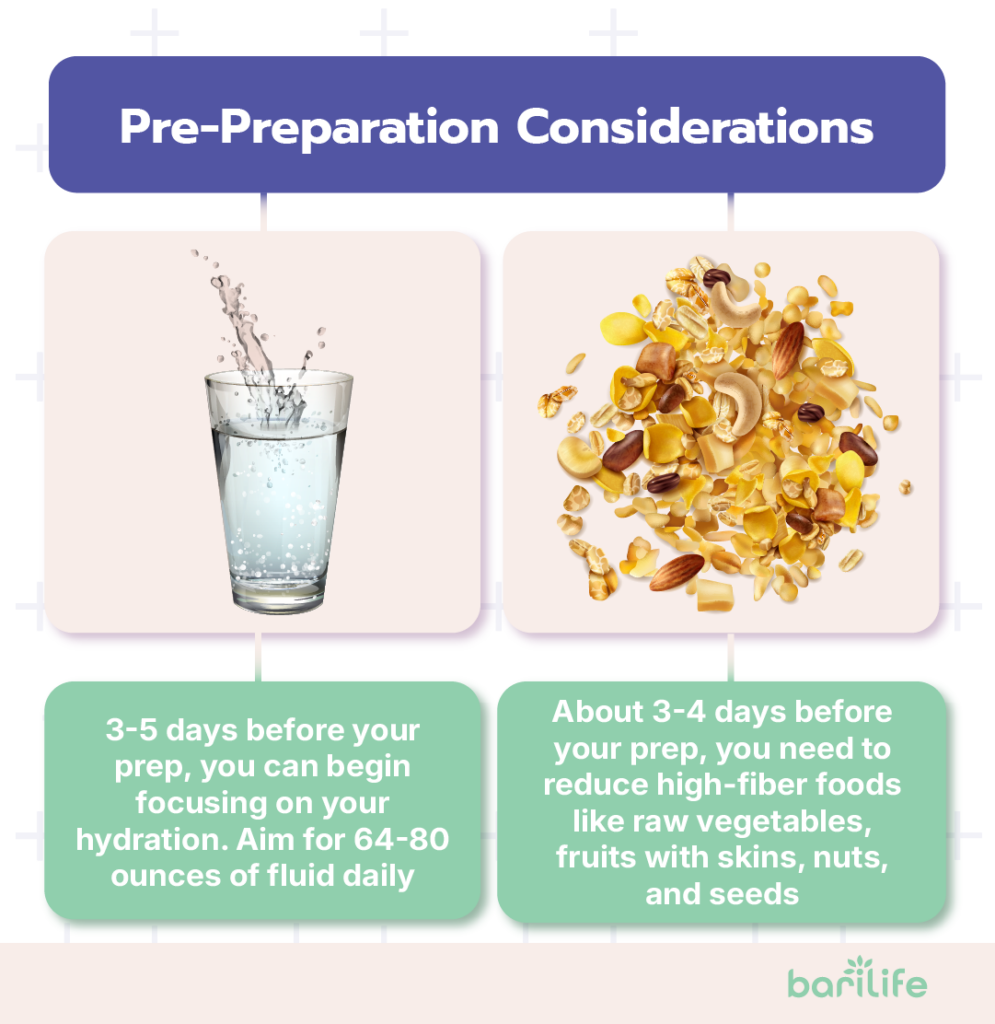
Starting your preparation well before the actual colonoscopy prep day can make the whole process much smoother.
Before scheduling your colonoscopy, talk to your bariatric surgeon first. Ask if they have specific recommendations based on your surgery type and how long ago you had surgery.
This is also a good time to ask about the pre-op process, including psychiatric evaluation for bariatric surgery, which may still be relevant for your overall health monitoring.
3-5 days before your prep, you can begin focusing on your hydration. Aim for 64-80 ounces of fluid daily. Many bariatric patients find it hard to maintain high liquids during prep, so starting out well-hydrated gives you an advantage.
About 3-4 days before your prep, you need to reduce high-fiber foods like raw vegetables, fruits with skins, nuts, and seeds since these can be harder to clear from the colon. If it stays in your bowel, it can mask areas that doctors need to examine.
Choosing the Right Bowel Prep Solution
Fortunately, there are several specialized approaches that can make this necessary process more manageable while still ensuring effective preparation for your procedure.
- Low-volume options: Ask your doctor about low-volume prep options like SUPREP, Prepopik, or PLENVU. These don’t require you to drink as much liquid, but they can still effectively clean the colon.
- Split-dose regimen: You can ask for a split-dose prep schedule where you take half the solution the evening before and half the morning of the procedure. This is also effective and is significantly easier for bariatric patients to tolerate.
- Flavor considerations: If you’ve had a gastric bypass, you may be more sensitive to sweets. Ask if there are unflavored options available or whether you can use sugar-free flavor enhancers that don’t trigger dumping syndrome for you.
- Timing between doses: For standard preps, ask if you can extend the time between glasses. Instead of drinking 8 ounces every 10 minutes, you might need 15-20 minutes between smaller amounts to accommodate your smaller stomach.
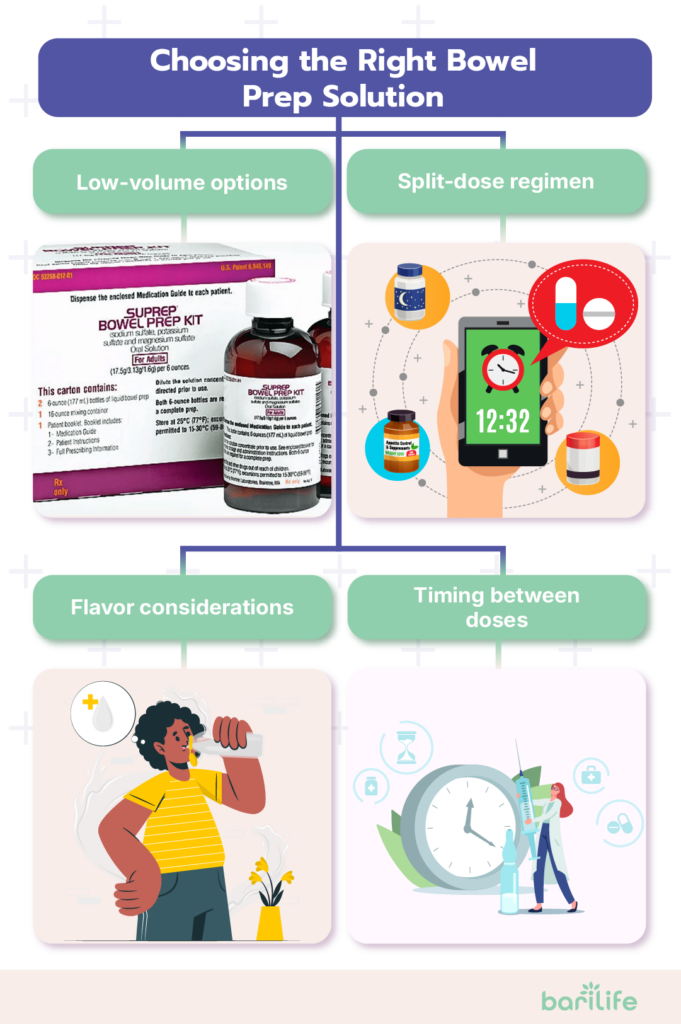
- Alternative methods: In some cases, your doctor might consider alternative prep methods, like extended-day preparations, which involve taking smaller amounts over a longer period. These are sometimes used for patients with limited stomach capacity.
In some cases, if you’re undergoing tests like a cleanse for bariatric patients before other procedures (including colonoscopy), your doctor may recommend more tailored bowel preparation strategies.
Medication and Supplement Adjustments
If you’re on blood thinners, discuss with your doctor whether and when to stop them before your procedure, since these medications can increase bleeding risk during the colonoscopy.
Bariatric patients with diabetes also require special considerations. You may need to adjust your insulin or medication doses during prep when you’re not eating solid food.
If you’re taking iron supplements, stop at least 5-7 days before your procedure, since they can make the colon harder to examine properly.
If you take acid reducers like omeprazole or famotidine, check whether you should continue these during prep or temporarily pause them.
Clear Liquid Diet Guidelines for Bariatric Patients
Unlike standard patients, you’ll need to incorporate some protein while you are following a clear liquid diet. Options like clear protein drinks and bone broth meet both requirements.
Be extremely cautious with sugar content during your clear liquid days. Traditional recommendations like apple juice, white grape juice, and regular Jell-O may cause dumping syndrome, so always opt for sugar-free versions instead.
Since bariatric patients can become dehydrated and experience electrolyte imbalances more quickly, make sure to include sugar-free electrolyte drinks like G2, Powerade Zero, or Propel among your clear liquid options.
Rather than trying to drink large amounts at once, set a timer to remind you to sip something every 15 minutes throughout the day.
To make the clear liquid diet more satisfying, you can include both warm, clear liquids (like broth and herbal tea) and cold options (like sugar-free popsicles).
Common Challenges and Solutions
Bariatric patients often face unique challenges during colonoscopy prep. Here’s how to handle them:
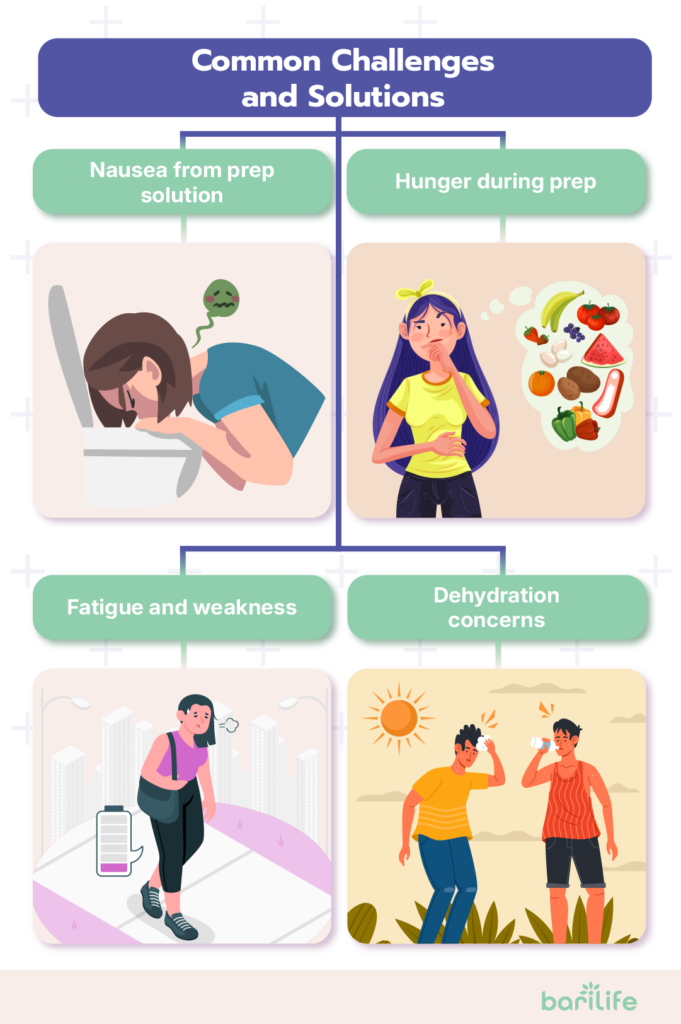
- Nausea from prep solution: Take your prep solution chilled, use sugar-free flavor enhancers if your doctor allows them, and sip slowly. Sugar-free peppermint candies and ginger tea can also help with nausea.
- Limited capacity for fluids: Take smaller amounts more frequently rather than trying to force down larger volumes. A good strategy is to use a small cup rather than the large one that might come with your prep kit.
- Hunger during prep: Clear protein drinks and bone broth can help reduce your hunger while staying within the clear liquid requirements. Some doctors may approve of thin protein shakes that are not colored. Red, purple, or darkly colored liquids are avoided during prep because they can stain the colon lining and can be mistaken for blood or other abnormalities.
- Fatigue and weakness: This is common during prep and may be more pronounced for bariatric patients. Plan for rest, avoid scheduling demanding activities, and keep sugar-free electrolyte drinks on hand.
- Dumping syndrome symptoms: If you start experiencing a racing heart, sweating, dizziness, or diarrhea that seems excessive even for prep, the sugar content in your liquids might be too high. Switch to sugar-free options immediately.
- Dehydration concerns: Watch for signs like increased thirst, dark urine, dizziness, or headache. Contact your doctor if you’re unable to keep up with fluid intake or show signs of dehydration.
- Acid reflux flare-ups: The prep solution can make reflux worse. Take any approved acid reducers, stay upright after drinking the prep solution, and avoid lying down for at least 30 minutes after drinking.
Day of the Procedure
On the day of your colonoscopy, make sure you are prepared with your own supplies, particularly sugar-free electrolyte drinks, for after the procedure. Make sure the anesthesiologist knows you’ve had bariatric surgery, as this might affect which anesthesia medications are used and in what doses.
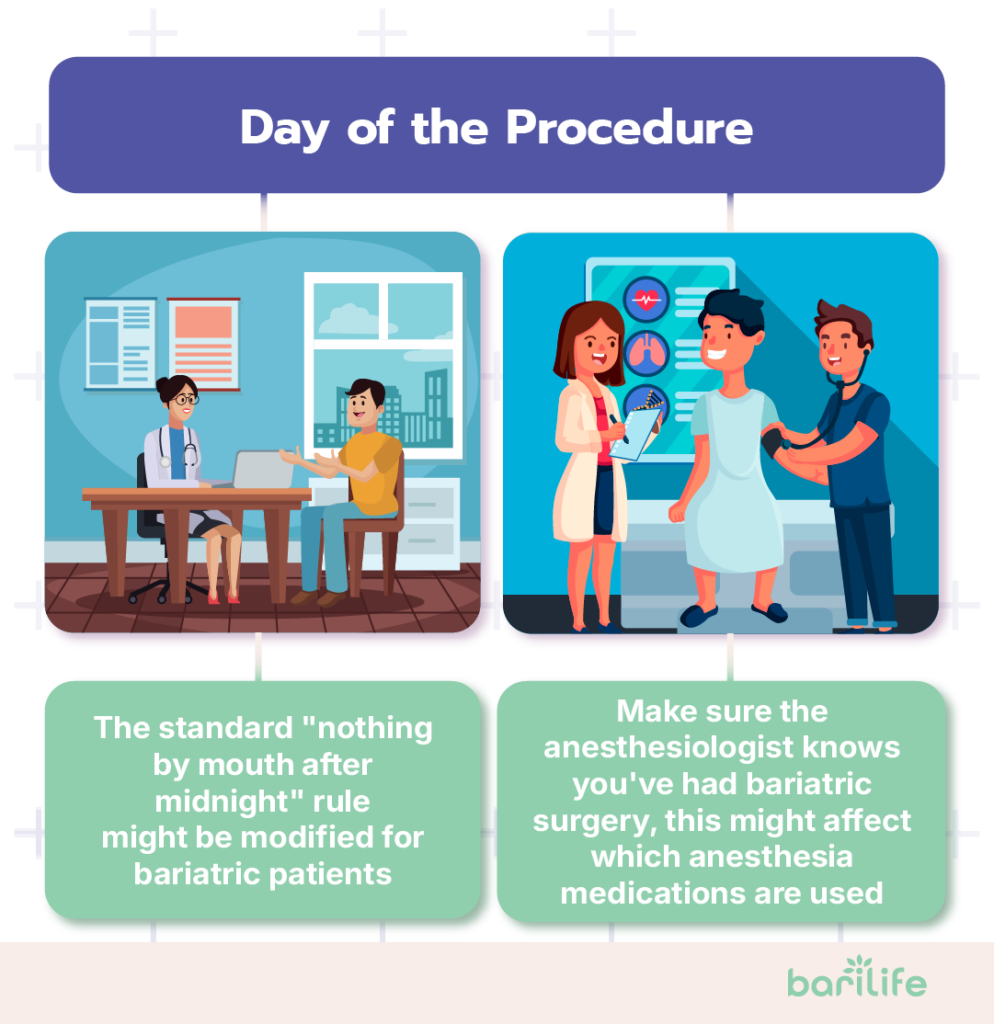
Follow your doctor’s specific instructions regarding the “empty stomach” requirement. The standard “nothing by mouth after midnight” rule might be modified for bariatric patients, especially if you’re doing the morning portion of a split prep.
Comfort is also important, so wear loose-fitting clothing that won’t put pressure on your abdomen after the procedure.
Finally, like all colonoscopy patients, arrange reliable transportation home afterward, as you’ll be unable to drive yourself due to the sedation effects.
Post-Colonoscopy Recovery for Bariatric Patients
After your colonoscopy, the first priority should be rehydration using sugar-free, non-carbonated liquids. Remember to sip slowly and consistently rather than trying to drink large amounts at once because this could cause discomfort to your smaller stomach.
When resuming food, follow your regular bariatric eating pattern rather than standard post-colonoscopy recommendations. Start with clear liquids, then progress to full liquids, followed by soft proteins, and finally, you can return to your regular bariatric-friendly foods as your body tolerates them.
As always, prioritize protein in your first solid meals after the procedure because this will support healing and help maintain your energy levels during recovery.
You might feel more gassy and bloated. This is normal for bariatric patients because the air introduced during the colonoscopy causes discomfort when working through a modified digestive system. Walking helps move this gas through your system more effectively.
Throughout your recovery, stay alert for unusual signs such as abdominal pain, vomiting, or an inability to tolerate liquids—contact your doctor immediately if these occur.
Conclusion
If you’ve had bariatric surgery, the key to a successful colonoscopy prep is to accommodate your smaller stomach capacity, avoid triggers for dumping syndrome, maintain protein intake where possible, and stay vigilant about hydration and electrolyte balance.
With these strategies, you can successfully prepare for a colonoscopy and quickly get back to your regular routine.
How Bari Life Can Help
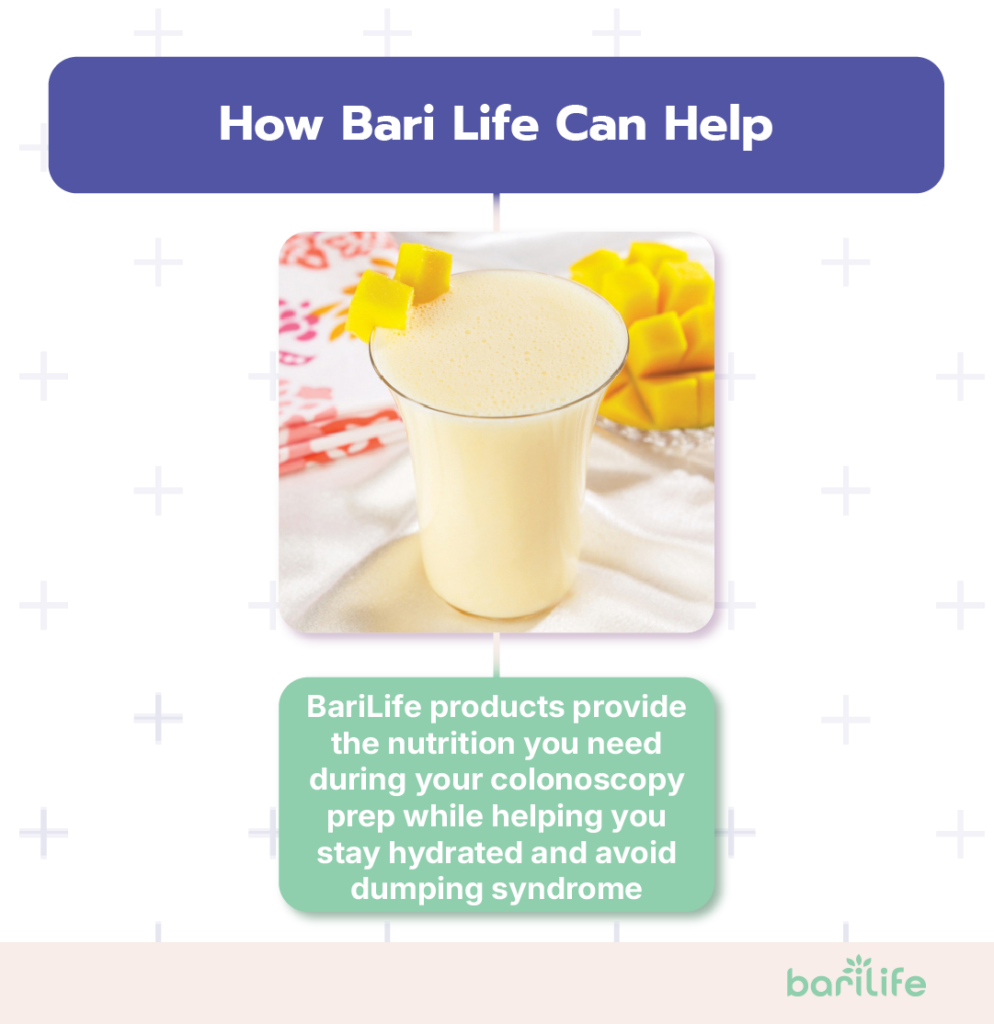
Bari Life offers a variety of clear liquid protein drinks and sugar-free electrolyte options designed specifically for bariatric patients. These products provide the nutrition you need during your colonoscopy prep while helping you stay hydrated and avoid dumping syndrome.
In addition to hydration support, Bari Life also provides a full range of bariatric vitamins, including bariatric multivitamins and bariatric multivitamin with iron, to help you maintain optimal health before and after your procedure. Their lineup of liquid bariatric vitamin options ensures you can easily absorb essential nutrients during the clear liquid diet phase.
For those looking to maintain protein intake, Bari Life’s bariatric protein shakes and bariatric protein bars are convenient, tasty choices that align with your nutritional plan. If you’re seeking variety, their collection of bariatric snacks gives you more flexibility while staying compliant with your dietary needs.
Bari Life also offers bariatric vitamins chewable for patients who prefer an easy-to-digest format, along with bariatric calcium chews to support bone health. And for digestive support, they provide a specialized bariatric probiotic to help maintain gut balance.
Experiencing thinning hair after surgery? Bari Life includes options targeted at bariatric vitamins for hair loss, helping you stay confident and nourished through every step of your bariatric journey.
With Bari Life’s carefully formulated supplements, you can confidently follow your doctor’s instructions without compromising your health or comfort.
Check out Bari Life’s selection of bariatric-friendly products to make your colonoscopy prep easier and stay on track with your nutritional goals!
If you want to learn more, why not check out these articles below:
Resources
Colonoscopy diet advice and preparation. (n.d.) NHS.
Dumping syndrome after gastric bypass surgery. (n.d.) Johns Hopkins Medicine.
Nam, J., et al. (2018). Impact of diet restriction on bowel preparation for colonoscopy. Medicine.



What are your tips and tricks to post-bariatric success?